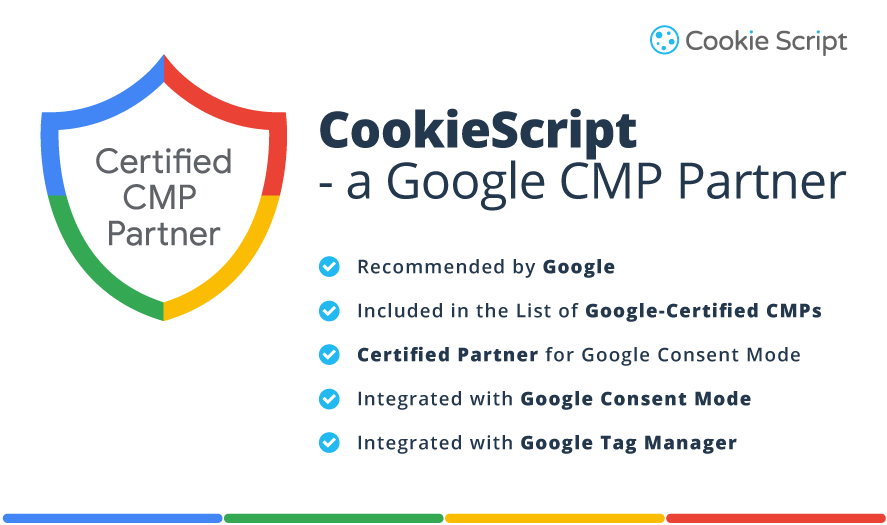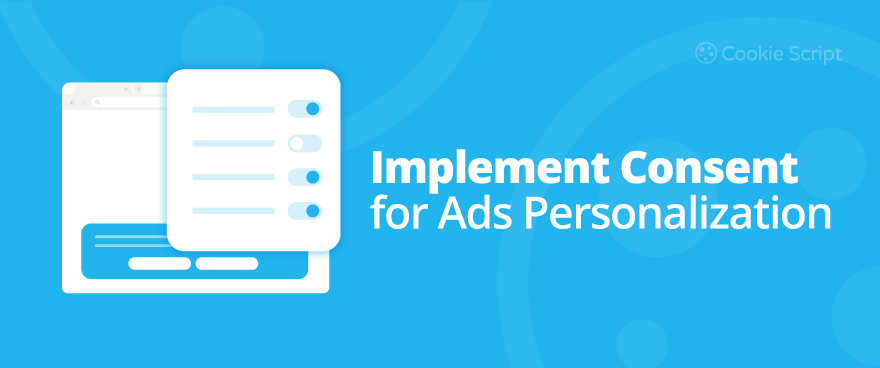
An image of Google Ads interface regarding Cookie Consent.
An image of Google Ads interface warns website and app owners that they could face account suspension in the European Economic Area (EEA) if they display non-compliant GDPR Consent Banners:
“Implement consent for ads personalization – You are not providing EEA end-user consent signals required for ad personalization features. Take action before March 2024 or your campaign performance will be impacted.”
This applies to the following Google Ad products:
- Google AdSense
- Google AdMob
- Google Ad Manager.
Let’s examine this message and its implications for analytics.
Why Now?
The General Data Protection Regulation (GDPR) and the ePrivacy Directive are the privacy laws in the EEA, which require a legal basis for the processing of users’ personal data and getting user consent for collecting their data. The new Digital Markets Act (DMA) was approved in 2023 and will go into effect in March 2024. DMA introduces various requirements to Google and other big companies, nominated as gatekeepers.
Google recently introduced the EU user consent Policy (EU UCP) to align with European privacy regulations and is updating from Google Consent Mode to Google Consent Mode v2. The objective of this policy is to ensure compliance with these regulations, so it mandates marketers using Google advertising services to obtain and respect users’ consent.
Google Consent Mode v2 adds two new consent states: ad_user_data and ad_personalization, which relate to how data is used and shared.
CookieScript is a Google-certified CMP partner, which supports the Google Consent Mode v2.
Read more about Google Consent Mode, Google Consent Mode v2, and what Google says about updates to consent mode.

New Regulatory Requirements
The EU user consent Policy imposes the following requirements for websites:
- In the EEA, the cookie consent is mandatory for:
the use of cookies, session storage, and local storage.
the collection, sharing, and use of personal data for the personalization of ads. - All parties that might collect, receive, or use users’ personal data that you collect through Google services must be clearly stated.
- End users could be able easily access clear and prominent information about how the stated parties intend to use their personal data.
This isn’t a suggestion- it’s a requirement. If advertisers in the EEA do not comply with these new regulatory requirements by March 2024, their advertising campaigns will be stopped.
Scan your website for free to see all your website cookies, session storage, and local storage in use.
Impact on Google Ads Campaigns
If you don’t implement consent for ad personalization, the impact for Google Ads campaigns would be significant:
- Data shortage. Without user consent, you will not have the required data for user targeting and personalization. You will get less precise targeting and a potential reduction in conversion rates.
- Increased costs. With less data, you will potentially get decreased ad efficiency, leading to higher costs per purchase.
- Decreased campaign performance. Without user consent, your ad campaigns may become less effective since Google’s algorithm relies on data.
- Decreased user trust. Not respecting user privacy can lead to decreased user trust in your brand reputation, which can have long-term negative effects.
Google Consent Mode v2 offers two consent modes for user consent, so you can choose between basic and advanced consent modes. Depending on the mode, Google algorytms use behavioral modeling and/ or conversion modeling to compensate for the data loss. Advanced Google Consent Mode allows us to retrieve the lost data even from unconsented users.
How to Fix This Issue?
When Google detects a reminder “Implement consent for ads personalization", it will send an email showing the problem and a deadline for fixing it. Google will monitor your account to make sure you’ve resolved the issue in time.
To continue using Google Ads products in the EEA, you need to implement Google Consent Mode v2 by March 2024.
The simplest option to implement Google consent mode v2 is to work with a Google-certified Consent Management Platform (CMP) partner, approved by Google. Google-certified CMP will keep up with new privacy requirements and changes dynamically and it could also enable consent mode for Google Ads and other Google services (GA4, Google Ads, gtag, Google Tag Manager, and Google Analytics).
How to implement consent for ad personalization if you don’t use a CMP?
If you don’t use a CMP yet, choose a Google-certified CMP from Google’s list of certified partners. The official list of certified CMPs is regularly updated and shows all CMPs, approved by Google.
Read the guide on how to choose a Google-certified CMP partner for ad compliance.
We are proud to announce that CookieScript CMP has fulfilled new IAB TCF V2 requirements and has become a Google-certified CMP. After a successful review and evaluation process, CookieScript CMP is included in Google’s list of Google-certified CMPs.
How to implement consent for ad personalization if you use a CMP?
If you already use a CMP for your website’s user consent management, make sure it supports Google Consent Mode Version 2.
If you already use CookieScript CMP, update your GTM CookieScript template to the latest version, and your website or application will automatically meet Google’s new privacy requirements.
Stop losing conversions in Google Ads! Start using CookieScript CMP, a Google-certified CMP partner, that integrates with the IAB TCF V2.2 framework and supports all ad publisher products — Google AdSense, Ad Manager, and AdMob.
Frequently Asked Questions
How to fix an issue: Implement consent for ad personalization?
To continue using Google Ads products in the EEA, you need to implement Google Consent Mode v2 by March 2024. The simplest option to implement Google Consent Mode v2 is to work with a Google-certified consent management platform (CMP) partner, selecting a CMP from Google’s list of certified partners. CookieScript CMP is a Google-certified CMP, included in Google’s list of certified CMPs.
How to fix an issue: Implement consent for ad personalization, if you already use a CMP?
If you already use a CMP for your website’s user consent management, make sure it supports Google Consent Mode Version 2. CookieScript CMP is a Google-certified CMP, included in Google’s list of certified CMPs. If you already use CookieScript CMP, update your GTM CookieScript template to the latest version.
What is the deadline for implementing Google consent for ad personalization?
Advertisers in the EEA must comply with new regulatory requirements and implement Google Consent Mode v2 by March 2024. The simplest option to implement Google consent mode v2 is to work with a Google-certified consent management platform (CMP) partner, selecting a CMP from Google’s list of certified partners. CookieScript CMP is a Google-certified CMP, included in Google’s list of certified partners.
What will be the impact on Google Ad campaigns for not implementing Google consent for ads personalization?
To continue using Google Ads products in the EEA, you need to implement Google Consent Mode v2 by March 2024. If you don’t implement consent for ad personalization, the impact on Google Ads campaigns would be significant: data shortage, increased advertisement costs, decreased campaign performance, and decreased user trust. Use CookieScript, a Google-certified CMP, to implement Google Consent Mode v2.
Why do I get a notice: Implement consent for ad personalization?
The new Digital Markets Act (DMA) was approved in 2023 and will go into effect in March 2024. DMA introduces various requirements to Google and other big companies, nominated as gatekeepers, which became responsible for compliance with GDPR and ePrivacy Directive. Thus, to continue using Google Ads products in the EEA, you need to implement Google Consent Mode v2 by March 2024. CookieScript CMP, a Google-certified CMP, can help you.
